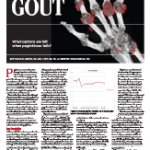(Reuters Health)—Many doctors who order computed tomography (CT) or magnetic resonance imaging (MRI) scans for patients with low back pain do so fearing that patients will be upset if they do not get imaging and because there is too little time to explain the risks and benefits of the tests, a new study found. The…
Liposomal Bupivacaine Helpful in Total Knee Arthroplasty
NEW YORK (Reuters Health)—Local infiltration of liposomal bupivacaine in patients undergoing total knee arthroplasty (TKA) curbed use of opioids and antiemetics and appeared to be both beneficial and cost effective in a recent study. As Dr. Bryan Sakamoto told Reuters Health by email, the results “suggest that liposomal bupivacaine is effective as part of a…

Proton Pump Inhibitor Use May Be Linked to Bone Mineral Density
The use of proton pump inhibitors may lead to changes in bone mineral density and an increased risk of developing osteoporosis…

Brave New MACRA World
Sweeping changes in how physicians are paid for patient care are on the way. The Medicare Access and Children’s Health Insurance Program (CHIP) Reauthorization Act of 2015, or MACRA, tossed out the Sustainable Growth Rate formula and ties reimbursement to quality measures. A Helpful Presentation Because 2017 is the first performance year under the new…
UnitedHealth Sees More Growth in 2017 When It Exits Obamacare
(Reuters)—UnitedHealth Group Inc, the largest U.S. health insurer, on Tuesday raised the possibility of stronger profit growth in 2017 as it exits the government-subsidized insurance market commonly known as Obamacare, encouraging investors who have been negative on the sector. The company said losses in that business were within expectations in the third quarter, news that…
2015 Workforce Study Results: More Rheumatology Clinicians Needed
Will there be enough rheumatology clinicians available to treat a growing patient population in the future? Not unless serious steps are taken now, according to the American College of Rheumatology’s 2015 Workforce Study of Rheumatology Specialists in the United States. The study’s complete findings will be presented at a panel discussion session at the 2016…
Road Rules for Social Media: As More Rheumatologists Go Online to Tweet, Chat or Post, They Must Learn How to Tread Wisely
For many practices, the benefits of social media—connecting with patients and exchanging ideas with colleagues—outweigh the risks, says R. Swamy Venuturupalli, MD, FACP. If rheumatologists set strategies for engagement and help shape the conversations, social media can be leveraged for research, community outreach, patient support and more…
Unclear If Sports Raise Later Arthritis Risk
(Reuters Health)—Playing team sports, especially soccer, at the elite level may lead to a higher risk for osteoarthritis, but the existing research is of such low quality it’s hard to say for sure, according to a recent review. In an analysis of past studies filled with conflicting results, researchers found that long-distance running was the…

Clinical Trial of Ixekizumab for Psoriatic Arthritis Shows Positive Results
A study found that ixekizumab decreases disease activity and increases physical function in biologic-naive patients with active psoriatic arthritis…

Pharmacokinetics May Be Factor in Success of Pegloticase Therapy for Gout
We read the case report by Dr. Diana Girnita and colleagues (“Severe Refractory Gout: What options are left when pegloticase fails?” The Rheumatologist, August 2016) with interest. A case is reported of a subject with 20 years of chronic refractory gout who failed to respond to pegloticase therapy, and the potential roles of anti-drug antibodies or…
- « Previous Page
- 1
- …
- 498
- 499
- 500
- 501
- 502
- …
- 842
- Next Page »